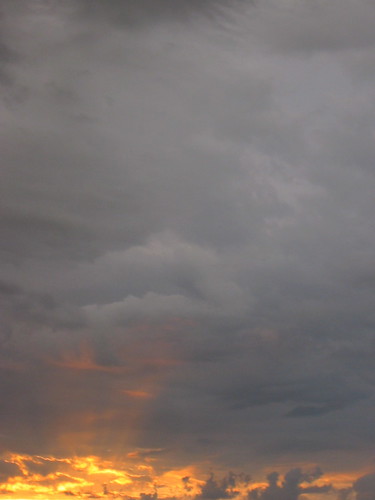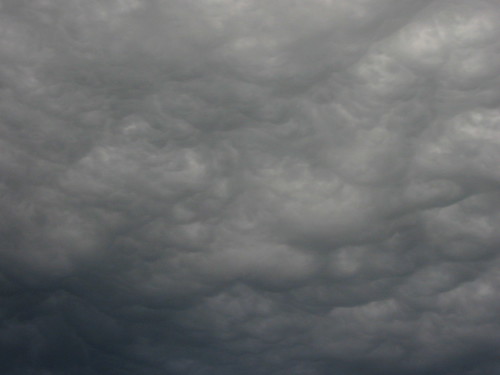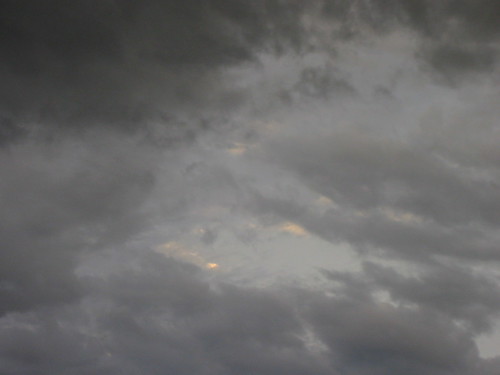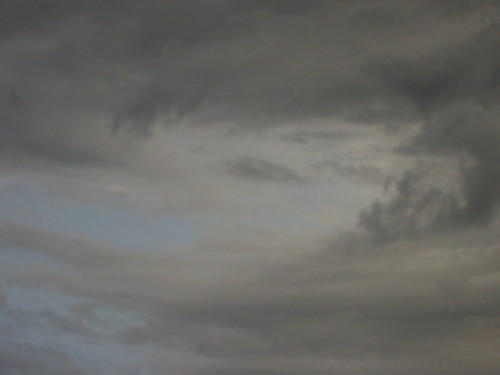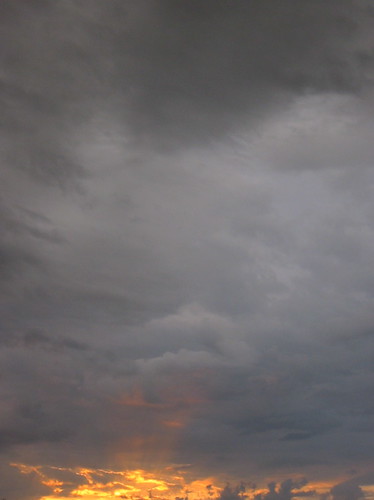
Some Clouds
Ah sweet cormorancy (“A large dark bird perched in an upright position on some rock or buoy over the water can hardly be anything else.”) Peterson’s earlier field guides put the cormorant on a page with the boobies. (When not diving deep in search of fishy literary whatnot, cormorants like to stand about—wings half-extend’d—in mock poses of abject helplessness.) One pleasure of John Ashbery’s Collected Poems 1956-1987 (Library of America, 2008): the sixty-five uncollect’d pieces. Fugitive things like “Nouvelles Pièces Froides” (beginning: “Stan and Angela can’t—can’t stan’ / Angela. I can’t understand / Each other. The two of them / With everything to live for can’t / Stand it at the same old stand. / Why? It’s a pun—a play on words”) out of Kenward Elmslie’s ZZZ (1974) or “Morning in Helsinki” (beginning in high nonchalance: “Angels visit us / Fairly regularly / But they almost never comment / On our containment”). Without attending too closely to the round-up, one thinks, “At last, all the early—print’d (one gets breeze-carry’d reports of unpublish’d things deposit’d with various custodians)—Ashbery poetry in a single volume.” So: looking into the copies of Locus Solus I drug out of the stacks, I am mildly stunned to find two pieces uncollect’d “still.” (Though list’d in David Kermani’s early—1976—bibliography, along with, I see, another uncollect’d piece call’d “From a Comic Book” that LeRoi Jones print’d next to “Leaving the Atocha Station” in Yūgen 7 in 1961.) The six Ashbery poems of Locus Solus I (1961): “Idaho,” “Spring Twilight,” “Thoughts of a Young Girl,” “The Passive Preacher,” “Winter,” and “A White Paper.” Era of The Tennis Court Oath (1962). See Ashbery talking to John Tranter (in 1985) about that early work, doubt and experiment vying with one another:
. . . I also hadn’t reread most of the poems in The Tennis Court Oath—my second book, which everybody throws up their hands over—in about twenty-five years. And some of them are a lot better than I thought. A few of them I’d read aloud sometimes for my poetry readings (maybe ten in the book), but the others I hadn’t reread since the book came out. I was surprised at how really interesting they are, because I’d concluded that they probably weren’t very good. And I did write them during a period when I didn’t know what I wanted to do, when I began living in France and I was unused to the foreign environment and language and everything. They were really experiments which I didn’t think would ever be published—I didn’t think I’d ever have another book published after [. . .] the colossal unsuccess of the first one.A story Ashbery’s repeat’d, too, elsewhere. One of the uncollect’d pieces:
Spring TwilightConstantly thwart’d, indistinguishable. One thinks (briefly) of Eliot, a kind of mockery of the high solemnity of “Ash Wednesday” (“Because I do not hope to turn again / Because I do not hope . . .”) in that “And before he had a chance to they go / And before he chance to get back . . .” One thinks, too, of American song (“I shall never marry the goose man”) and story (“porridge,” “beans,” “A glass girl and I”). Is there a loose thread of animosity / indifference toward womankind here, never yank’d too hard? (“She is oinking at the bars,” “She hips unlikely fail match” “She gleams my fat,” &c.) Some of it sounds Clark Coolidge pre-Clark Coolidge (“Sausage pinnacle storm windows”) or “Instead of ant wort I saw brat guts” crewish (The Tennis Court Oath being one of Language writing’s own grande permission works). The other uncollect’d:
What are they destroying there, greasy there
All gloated? The fantail
Best and all females
With the beer
On the riding night
The fat and ice nearing to me
In poles She is oinking at the bars
I think so instead mad pulp
The poles borne closer nautical edge
She hips unlikely fail match
Contrasting life.
Line for the
Great forked wobbling over my shoulder
Sausage pinnacle storm windows
To stroke the drawing room iced nuts
Down the avenue on the box
She gleams my fat
It barks on the prompt avenue noiselessly
Afoul pieces in which her
Massive feet and ankles
The stone partridge expelled mud
Slanting floor of spring
“Actually lined the face with brow
I shall never marry the goose man
I shall never marry the goose man
Tell the avenue
And before he had a chance to they go
And before he chance to get back
Its second dog
The porridge after good-looking woman
Was employed in craze
The visits of fate
The visits of fate
The visits of fate
Twisting the usual of dummy
Downgraded reptile of beans
Tomorrow now the lightened tree
My country
Machines to do work
And match—light his pride
With crow The facts is too important
It seems to me beaver pets
Wait in the barrel is nearer
Perfect bus white man’s
Violation of sleep the near thing
Which will remove
Can lice
To accept a little
Sickness, to my valentine in the bulb.
She ran out of the drawing room into the street
A glass girl and I The factors
Of southern states
Would you distinguish for us.
WinterWhat, in a later piece (“The New Spirit”) becomes “examples of leaving out”: “clean-washed sea / The flowers were.” With its admonitory shrug (or shrug within a shrug): “But, forget as we will, something soon comes to stand in their place. Not the truth, perhaps, but—yourself. It is you who made this, therefore you are true. But the truth has passed on / to divide all.” “Winter” is something of a purely tonal piece, the aerated fragments mounting narrative tones—anxiety, lassitude, joy, puzzlement—rather than narrative trajectory (note the self-referential commentary, “unresolved / of how, when and by whom / a pleasure”). Irresolution in lieu of “all incomprehen / afterward”—the result of so much “much happens been told / and written” doings. Sparse economies of nigh naught, array’d. Conjunctions without conjunct. Ashbery’s wry humor nonetheless evident: “band stinks. Are still close friends.”
There is a
I like however
He didn’t want to get that
responsibility?
to worry about made
new cars came out the the day
all we’ve got don’t try to build
walk her kept saying, No, we’re going
keeps I think you
except in when I think you
It was
moderately are all right is wonderful
Has the
gotten us?
, of apathy
A modern such a fundamental
against the rocks.” At the bottom of the
omen of the bad really gets
gives you a you are to complete
threatens for the but I under
trap of shoulders longer written
won’t he anybody
of the artist
(something without very little respect
to these people but I
Please let
with which they are
falling into her hands
is a constant . . . empty it . . . I can’t stand
with equal parts build over the
pervade
lunch at four and event
against the white surface
An international In the Part of the
early spring by the bright where
deserted weather I had just almost
with woven that smell before you to shut up
That’s where
have soaked in it
You fall in love
Whore! Bitch maniac You don’t
wounds
to be annoyance and hopelessness
crash after arriving
in New York
Complete marked sophomores younger
sensational our house tonight! had heard
whose is remarkably to catch in him
pitch, floating That day were like those
he jiggled hap- (he and
and a clip “Marvelous!”
Marvelous! Perfect! to offend artists he is help-
in disapproval. But when the “betrayal” music
And had set the color all by himself
had quarrelled freely It was very painful for
both of us
went out and persuaded him “Sir” has
enabled him went out of his mind
paid his bills and
supervisor of as sometimes borders
Had he taken percentages
band stinks. Are still close friends
It’s always a pleasure Sunday morning Not long
ago I asked
him Ugh! All I ask, as I’ve and
eventually set out to put on each
Saturday by featuring
on the telephone
Does he take you to a fancy restau-
Showing you the fash-
pretty girls around town?
feet high up Nobody knows Nobody cares
stayed lost to what is to set up your
And the weirdest the efforts explorers
he wrung a good base for it
All good things
recorders
of your parents
men joined
And the dozen others
mindless
, but until
And music schools And
What began as
Your ten-dollar
—then the very fact jazz is
It is the first age
As a result
French horns
early forties
relative obscurity
the early fifties
playing blues.
But listen a little closer too
legs sleeps on her stomach
fried chicken and the free whiskey
but it, like
adds mystery to having them play
and at best
suspension, the sad
then had begun, the mural
entire cast
they’ll repeat all the
the very effort to sandpipers
Through a wall of crystal who came here
with good times.” of the early morning, was
coined here
unresolved
of how, when and by whom
a pleasure
too rapidly
into a new key
that time excep-
who came to
moment was past much happens been told
and written, with all incomprehen
afterward not how it was
As they themselves knew it
for the lamp in timeless
the room had
Caught
riots, unemployment
During the time it was happening
The painting,
Suspension of time. The more brilliant. which it
pretends
world on the blast
language and for those in whose lives
at such long range, their imaginations
the dance steps
by tuberculosis
, “they’ll tell you in London’s
who found them most
old, deep bed old moods
a great
most their own.

John Ashbery, c. 1998
(Photograph by John Tranter)
(Photograph by John Tranter)
